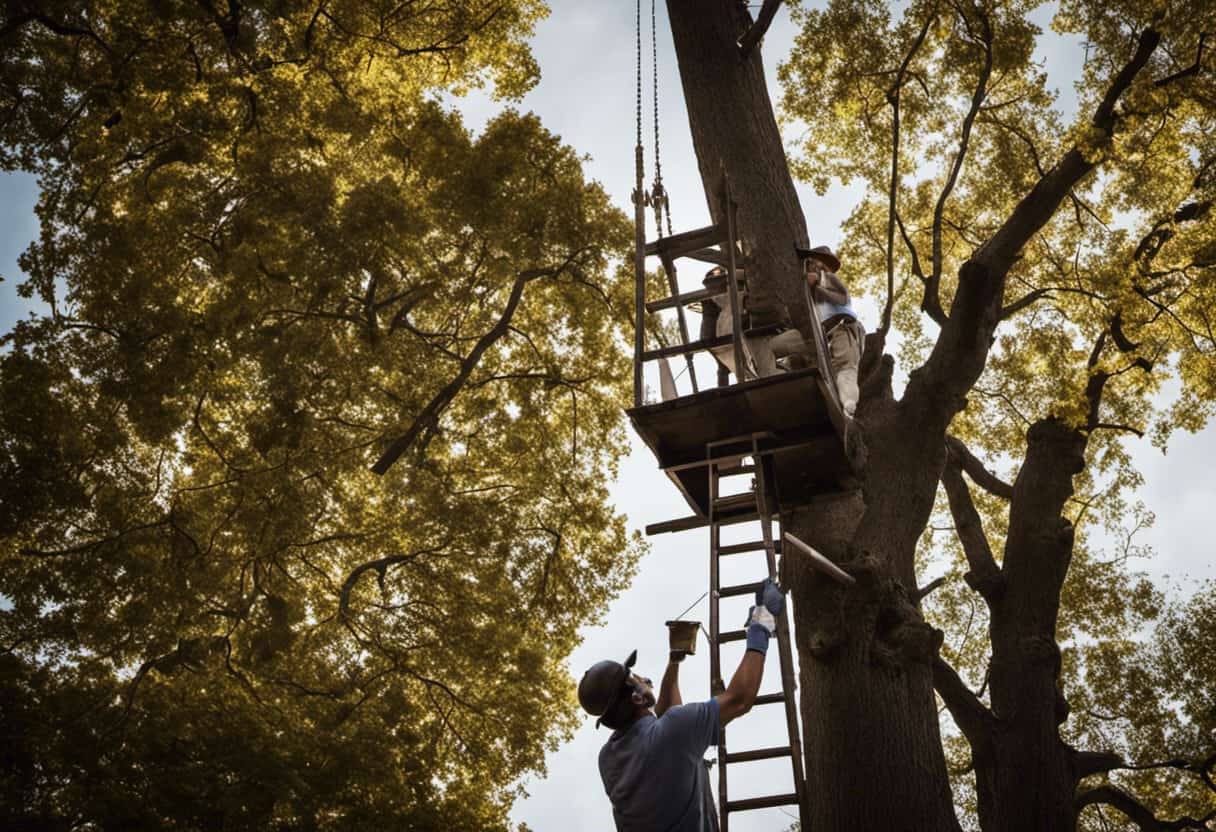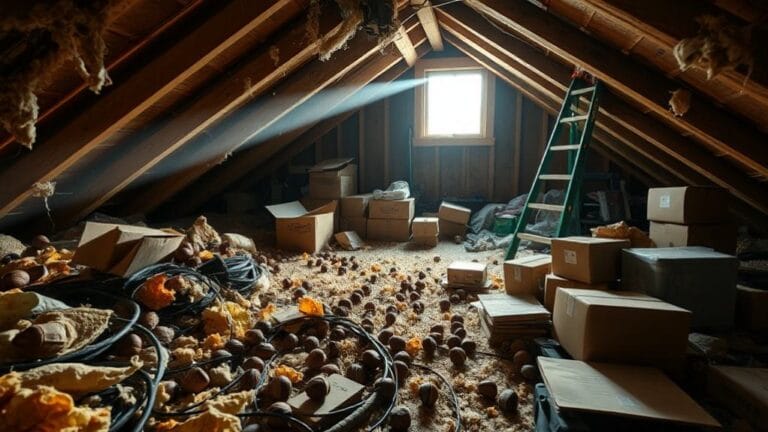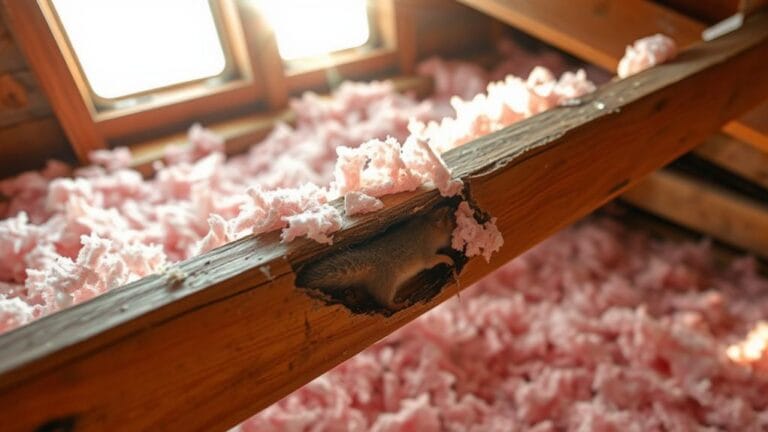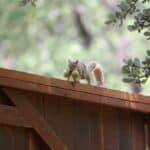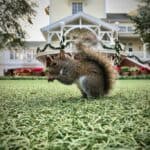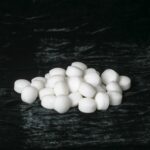Imagine standing in your backyard, looking up at the trees, and hearing the incessant chatter of squirrels. They dart from branch to branch, wreaking havoc and causing damage. You want to find a solution to this problem, to finally rid your trees of these pesky creatures.
Look no further! In this article, we will guide you through effective techniques to eliminate squirrels from your trees once and for all. With a little knowledge and some practical strategies, you’ll be able to restore peace to your outdoor space.
Key Takeaways
Table of Contents
- Understanding squirrel behavior and diet helps in eliminating or securing potential food sources.
- Identifying squirrel entry points and sealing them can prevent squirrels from accessing your property.
- Implementing natural deterrents such as peppermint oil and hot pepper flakes can make the environment unpleasant for squirrels.
- Using traps, repellents, or seeking professional help are effective methods for getting rid of squirrels in trees.
Understanding Squirrel Behavior
Understanding squirrel behavior is essential when trying to find effective ways to deter them from trees. Squirrels have a diverse diet consisting of nuts, seeds, fruits, and insects. They are known to raid bird feeders and gardens in search of food. By knowing what they eat, you can take steps to eliminate or secure potential food sources.
Squirrels also have specific nesting habits. They build nests called dreys in tree branches using twigs and leaves. These nests provide shelter and protection from predators. Understanding their nesting habits can help you locate and remove any existing nests in the trees on your property.
Identifying Squirrel Entry Points
To identify where squirrels are getting into your property, you’ll need to look for small openings or chewed areas near the roofline or around vents. Squirrels are agile climbers and can easily access your property through these vulnerable points.
To prevent squirrel damage and keep them out of your property, consider the following:
- Seal any gaps or cracks in the exterior of your home or building to prevent squirrels from entering.
- Install mesh screens over vents and chimney openings to block squirrel access.
- Trim tree branches that are close to your property, as squirrels can use them as bridges to gain entry.
Effective tree pruning is crucial in preventing squirrel access to your property. By removing branches that are close to your home, you eliminate potential pathways for squirrels to enter.
Regular maintenance and inspection of your property can help identify and address any potential entry points, ultimately keeping squirrels at bay.
Implementing Natural Deterrents
You can try using natural deterrents such as peppermint oil or hot pepper flakes to discourage squirrels from entering your property.
These natural squirrel repellents work by creating an environment that squirrels find unpleasant or intimidating.
Peppermint oil has a strong scent that squirrels dislike, so applying it around areas where squirrels may enter, such as doorways or windowsills, can help keep them away.
Hot pepper flakes, on the other hand, create a spicy sensation that squirrels find uncomfortable. Sprinkling these flakes in your garden or on bird feeders can deter squirrels from coming near.
Using Traps and Repellents
Using traps and repellents is an effective way to deter squirrels from entering your property. Here are some alternative methods you can try to prevent squirrel damage:
Traps:
Live traps: These humane traps capture squirrels alive so you can release them elsewhere.
Lethal traps: These traps are designed to kill squirrels quickly and efficiently.
Repellents:
Scent-based repellents: These products emit strong odors that squirrels find unpleasant.
Taste-based repellents: These repellents make plants, fruits, or bird feed taste bad to squirrels.
Sound and visual deterrents:
Ultrasonic devices: Emit high-frequency sounds that are irritating to squirrels.
Motion-activated sprinklers: These devices spray water when squirrels approach, scaring them away.
Seeking Professional Help
If the squirrel problem persists, consider seeking professional help to effectively address the issue. While DIY methods may seem cost-effective, there are potential risks involved in trying to remove squirrels on your own.
Professional squirrel removal services may come at a cost, but they offer several advantages. Firstly, professionals have the expertise and experience to safely and humanely remove squirrels from your property. They use methods that comply with local regulations and minimize harm to the animals.
Additionally, professionals can provide a thorough assessment of your property to identify entry points and recommend preventive measures to avoid future infestations. DIY methods, on the other hand, may not be as effective or could inadvertently harm the squirrels or damage your property.
Seeking professional help ensures a more efficient and long-term solution to your squirrel problem.
Frequently Asked Questions
Can Squirrels Cause Damage to Trees?
Squirrels can cause damage to trees by gnawing on bark, creating holes for nesting or food storage. Prevent squirrel tree damage by installing metal barriers or using repellents.
How Do Squirrels Build Their Nests?
To understand how squirrels build their nests, it’s important to explore their natural instincts and behaviors. Squirrels construct their nests using a variety of materials, such as twigs, leaves, and moss, creating a cozy and secure place to rest and raise their young.
Can Squirrels Transmit Diseases to Humans?
Squirrels can transmit zoonotic diseases, such as rabies, to humans. It is important to avoid direct contact with squirrels and to keep pets vaccinated. If bitten or scratched, seek medical attention immediately.
Are There Any Natural Predators of Squirrels?
Natural predators of squirrels play a crucial role in squirrel population control. They help maintain a balance in nature by keeping the squirrel population in check. This ensures a healthy ecosystem for all species involved.
Do Squirrels Hibernate During the Winter?
Squirrels do not hibernate during winter. Instead, they remain active, although their behavior changes. They spend more time in their nests, relying on stored food and their diet shifts to nuts, seeds, and bark.
Conclusion
In conclusion, getting rid of squirrels in trees can be a challenging task, but with the right knowledge and tools, it is achievable.
By understanding squirrel behavior and identifying their entry points, you can effectively deter them from nesting in your trees.
Natural deterrents, such as motion-activated sprinklers and squirrel-repellent plants, can be effective in keeping squirrels away.
Additionally, traps and repellents can help in removing persistent squirrels.
If all else fails, seeking professional help from wildlife control experts is a viable option.
It is estimated that squirrels can cause significant damage to properties, with an average cost of $300-$500 for repairs and removal services.
Therefore, taking proactive measures to prevent squirrel infestations is essential to avoid unnecessary expenses.

